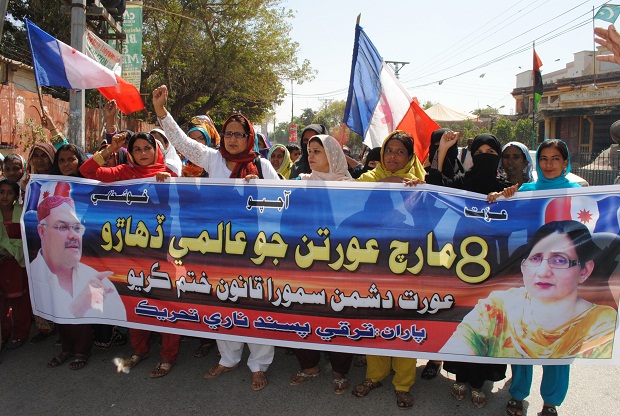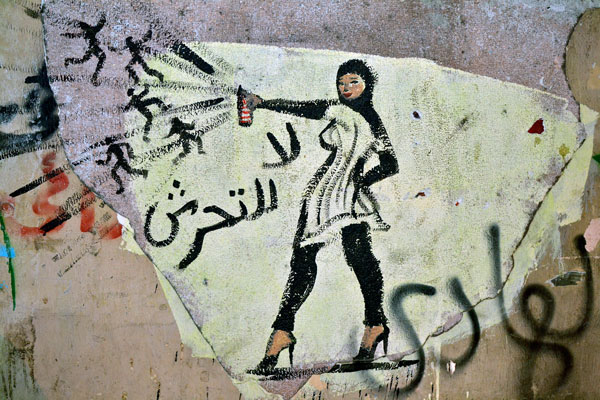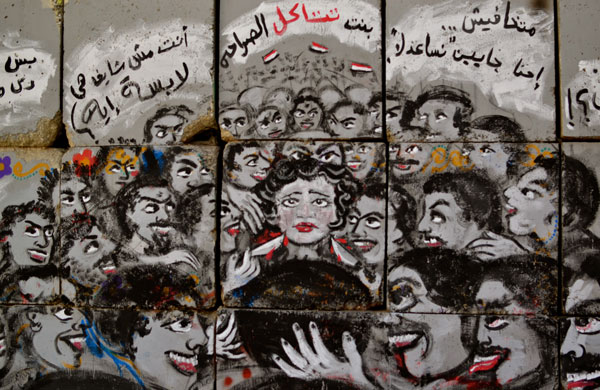24 Jan 2014 | News, Pakistan, Religion and Culture

Hindu women protest in favour of Rinkle Kumari who was forced to convert to Islam in 2012 (Image: Rajput Yasir/Demotix)
December 21 will forever be etched on the memory of Sapna and her family. Belonging to a poor Hindu family, Sapna and her older sister Sabita were teachers in a neighbourhood school in Paharipura, Peshawar, the capital city of Khyber Pakhtunkhwa province. They were the sole breadwinners for the family after their father, who worked for Radio Pakistan, retired four years ago.
On that cold wintry day Sabita stayed after school to give extra tutoring while Sapna walked home alone. During her walk a car suddenly pulled up alongside her- out jumped a man who placed a cloth doused in an unknown chemical over her face. Sapna passed out.
When she regained consciousness she found herself in unfamiliar surroundings. A man, whom she had never seen before, asked her to marry him. But first Sapna would have to convert to Islam.
On her refusal, the man placed the intoxicant-doused cloth over her nose and she fainted once again. This routine carried on for 16 days.
Sapna narrated her account of the kidnapping to the judicial magistrate earlier this month after she was rescued.
“The police traced her through a phone call she made to us asking us to rescue her,” Ramesh Kumar, her brother-in-law told Index on Censorship during a phone interview. He, along with his wife, Sapna’s older sister, had accompanied the police and found her in a village in Bahawalpur, in Punjab province some 680 km from Peshawar.
“Unfortunately, the person who kidnapped her, Zahid Nawaz, got a tip-off and escaped,” said Kumar. Nawaz wasn’t a complete stranger to Sapna. Kumar believes that his sister’s kidnapper had managed to ensnare Sapna by calling her a few times before the snatching took place.
“When he learnt that she was a Hindu, he told her that he didn’t have a sister and looked on her as one,” he added.
Despite being the first case of its kind in the area Sapna’s kidnapping has spread fear among the Hindu community in Peshawar- since the day her sister was abducted Sabita has not been allowed to step out of her house.
However, the kidnapping of Hindu girls is nothing new in other parts of the country. According to Ramesh Kumar Vankwani, head of the Pakistan Hindu Council and a legislator: “We hear of three to four such cases every month from Sindh [province].”
More worrisome to the independent Human Rights Commission of Pakistan (HRCP) is the forced coercion of these Hindu girls to Islam before marriage takes place. The majority of these cases have been reported in the Sindh area with the HRCP calling it one of the “most outrageous human rights violations one has to deal with.”
I.A. Rehman, of the HRCP, blamed both the state and society for the escalation: “Both are getting more and more caught in the frenzy of religiosity, a process accelerated by the increase in Al-Qaeda/Taliban/Salafi influence on Pakistan’s Muslims.
“Hard-line Islam is supposed to liquidate non-Muslims and Shias and people belonging to other sects, such as Barelvis who enjoy music and visit shrines,” referring to the recent killings of devotees at a sufi shrine in Karachi earlier this month.
At the same time, he pointed out, the “zealots” among the society hoped to secure a “place in paradise” by converting non-Muslims to Islam. Hindus account for just over one per cent of the Pakistan’s population of 180 million.
Rehman deplored how the judiciary had been unable to intervene in such cases, noting how such lack of action reassures the culprits and depresses the communities of the victim.
Most religious minority members sitting in the assemblies are selected, as opposed to elected, and are therefore not the true representatives of their communities. Instead, they often toe the party line that has given them the ticket to their seat.
For their part, people like Vankwani say: “The main political parties pay lip service to our problems but have consistently failed to protect our lives or our rights,” arguing that until fair representation of minorities occurs in the assemblies their issues will never be resolved.
Amar Guriro, a journalist from a Hindu community, had a different take on the issue of coerced conversion. “There are cases where girls have converted of their own will or have eloped because, unless their parents can pay the heavy dowry that is demanded by the groom’s side, they cannot be married off,” he said.
Muslims have often been accused of preying on Hindu girls of marriageable age, forcing families to marry off their daughters at an earlier than desired time. “If they don’t there is a danger they may be kidnapped and asked to renounce their religion,” Guriro reported.
According to Amarnath Motumal, a lawyer with the HRCP, young Hindu girls may easily get “influenced” by their Muslim paramour: “In a country where even in schools Islam is the only religion taught and where religious freedom is negligible, young minds can easily be moulded.
“In Pakistan a Muslim woman cannot be married without the consent of the waali (her guardian — a father, uncle, or brother). Why didn’t the same hold true for the Hindu girl who had converted?”
Motumal has appeared in several cases of forced conversions. He told Index that during these hearings there is immense pressure on not just the young girls but also the judge as hundreds of protesting clergy can gather outside the courtroom. “The girls often do not have the courage to speak how or what they feel about the predicament they are in. And if the woman converted of her free will, why is she not allowed to meet with her parents?” he asked.
In 2012, the cases of Rinkle Kumari from Ghotki and Dr Lata Kumar in Karachi were taken up by the court after concerns arose in the media that they were forcefully converted to Islam.
Today, Motumal said, both women live with their respective Muslim husbands, but, he added: “They may be apparently happily married, but who knows what is going on in their hearts. They know what their fate will be if they have a change of heart and mind — they may be shunned by their own community and never find a match!
“Most believe themselves to have been polluted beyond redemption and prefer to stay with their abductors to returning home.”
This article was posted on 22 January 2014 at indexoncensorship.org
17 Sep 2013 | Egypt, News, Politics and Society, Religion and Culture

(Photo: Melody Patry / Index on Censorship)
Sexual harassment has been widespread in Egypt for decades but since the January 2011 uprising that toppled former President Hosni Mubarak, the problem has taken on epic proportions becoming what rights activists now describe as “an epidemic”. Not only has there been a dramatic increase in the number of harassment cases reported , but the level of violence too, is unprecedented with mob sexual assaults becoming rampant during street protests.
No fewer than 91 girls and women were reportedly gang raped and sexually assaulted in just four days during mass protests demanding the ouster of Islamist president Mohamed Morsi last July. Rights activists say the number of assault cases could be even higher as there is the possibility that some cases had gone unreported. Most of the attacks occurred in or near Tahrir Square in downtown Cairo where hundreds of thousands of opposition protesters had gathered to demonstrate against the Muslim Brotherhood president and later, to celebrate his downfall. Vicious mobs used metal chains, sticks , blades and knives to attack female protesters despite the presence of volunteer vigilante groups keeping an eye out for harassers.
In response to the surge in harassment, several civil society organisations have sprung up in recent months with the aim of curbing sexual assaults and protecting victims of harassment. One such organisation is the Anti-Sexual Harassment Campaign , an outreach movement set up in November 2012 to keep track of harassment cases and send teams of volunteers to protest sites to intervene in mob assaults. The organisation is just one of several movements monitoring protest sites and offering ‘safety advice’ to women. The emergence of such movements is evidence of the growing unwillingness to tolerate street harassment as public awareness about the problem increases .
Police in Egypt have meanwhile, formed a special unit of female police officers to combat street harassment in particular, and violence against women in general. While the unit is still small in size –consisting only of ten women—rights campaigners believe it is “a step in the right direction.”
“Often women victims of harassment are too ashamed to report incidents of harassment and sexual assault. In some cases , they are afraid of getting blamed”, Azza Kamel , founder and director of women’s rights organisation Appropriate Communication Techniques (ACT), said in an interview. “They may feel more at ease talking to another woman about the issue,” she added. Her organisation has run a hotline for eyewitnesses and women victims to report sexual harassment or assault cases which are known to increase and get more violent during public holidays and religious festivals.
Fatma Khafagy, chairperson of the National Women’s Council ‘s Ombudsman Office meanwhile, lamented that male security officers do not take sexual harassment seriously enough and at times, themselves harass women who come forward to report such incidents.
With a background in psychology, the women police officers have undergone training in communicating, listening and helping to rehabilitate victims of harassment and assault. “We encourage women to speak up and report harassment. They should not blame themselves for causing the harassment and must not hesitate in seeking justice”, said Colonel Manar Mokhtar, one of the officers at the new police unit for combating violence against women. “We also urge them to seek professional counselling that can help them recover from their traumatic experience.”
Victims of harassment often complain of a “culture of impunity” at the state level, saying that perpetrators often go unpunished for their crime. “But that is slowly changing with the growing awareness about the problem,” Khafagy noted.
She acknowledged the pressing and urgent need for legislation to counter the problem, given the surge in violence against women in Egypt, post revolution. A study conducted in April by the Egyptian Center for Women’s Rights revealed that 99.3 percent of Egyptian women have experienced some form of sexual harassment.
“In the absence of laws against sexual violence, we can only expect street harassment and sexual assaults to continue unchecked”, argued Khafagy.
A bill on violence against women that was recently drafted by the National Council for Women and was under discussion in the now-disbanded Shura Council, the upper house of parliament has been shelved due to the political instability.
Khafagy and other rights activists however, believe that legislation won’t be enough to tackle what they described as “a social scourge.”
“The answer lies in changing people’s attitudes. Educating women about their rights and getting men to realize the extent of the harm they inflict on the women is the only way that we can change existing behavioural patterns,” insisted Kamel. “But change cannot happen overnight; it takes time.”
For Egypt’s women victims of harassment, it cannot happen fast enough.
This article was originally posted on 17 Sept, 2013
18 Jun 2013 | Egypt, Middle East and North Africa, News

Photo: Shutterstock
A proposed bill in Egypt outlawing violence against women has now been proposed by the country’s National Council for Women. But is it a step forward in tackling the silence around sexual harassment in the country? Shahira Amin reports
Egypt’s National Council for Women (NCW) has submitted a draft law addressing all forms of violence against women to the Shura or Consultative Council, the country’s lower house of parliament.
The proposed law would criminalise violence against women, including forced marriage, trafficking, female genital mutilation, and sexual harassment in its many forms. The law also includes provisions encouraging victims to report incidents of harassment and assault, while ensuring their protection.
The draft came at the request of Prime Minister Hisham Qandeel, after a rise in the number and intensity of sexual assaults at protests. The violence peaked earlier this year, when 25 female protesters were the victims of mob violence and sexual assault during protests in Tahrir Square on the second anniversary of the 2011 mass uprising.
Sexual harassment is a daily reality for the majority of Egyptian women: a UN report released April 2013 estimated that 99 per cent of Egyptian women have been subjected to some form of harassment.
If passed, the law will be a step towards addressing Egypt’s crippling culture of self-censorship around violence against women.
Social stigma around sexual assault and rape has been a barrier in speaking out in Egypt’s conservative society, but this taboo has been actively challenged since the fall of former President Hosni Mubarak more than two years ago.
“Because a girl’s chastity is linked to family honour, women were either too ashamed to report the incidents to the police for fear of being stigmatised or they blamed themselves for causing the harassment or assault believing it may have happened because they were not dressed modestly enough or were out at a late hour,” explained Nehad Abou Komsan, head of the Egyptian Center for Women’s Rights.
“With the fear barrier gone and in the freer post-revolution environment however, more women are coming forward to report assault or rape incidents. That is the positive change that the revolution has brought: the silence has been broken,” she told Index. The provision guaranteeing protection for witnesses to assault incidents will also encourage them to come forward with their testimonies instead of turning a blind eye to such incidents, she added.
Egypt has seen a surge in violence against women post-revolution, sparking a more emboldened movement against sexual harassment, which some have alleged to be politically motivated. Movements like Tahrir Bodyguard and Harassmap have formed in order to address and speak out against sexual harassment. Women have been more vocal in speaking out in the media, and giving graphic accounts of their experiences.
NGO Nazra for Feminist Studies has explained the surge in violence against women post-revolution as “a continuation of the ousted regime’s policies and part of attempts by the various security agencies and the remnants of the former regime to keep women away from the public sphere.”
While rights campaigners hail the draft law on violence against women as “a major step in the right direction”, they say legislation alone will not end violence.
Fatma Khafagy, NCW ombudsman said that “what is needed is a change in the mindset of both women and men. Men have to learn to respect women as equal partners in society, while women have to realise that they should not tolerate violence in any form”, said Khafagy. Changing attitudes will take time, she noted, adding that “what is important is that the process has started .”
While rights advocates hail the bill as “timely”, they fear that the Islamist-dominated Shura Council may block the bill on the grounds that it may be seen as violating Sharia or Islamic law.
In March this year, the Muslim Brotherhood issued a controversial statement during this year’s Commission on the Status of Women (CSW) rejecting the document drafted on eliminating violence against women, saying that it included articles that “contradict the principles of Islam and destroy its ethics”.
The Muslim Brotherhood’s stance was quickly condemned by the NCW.




